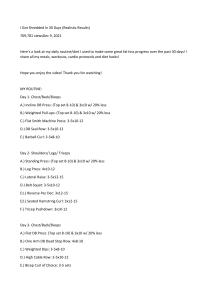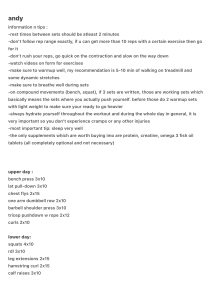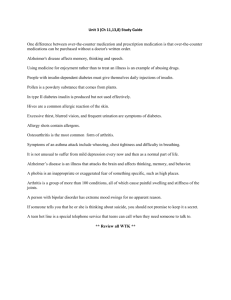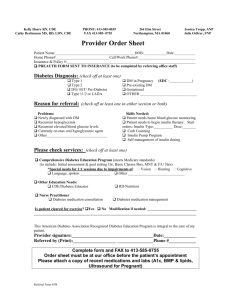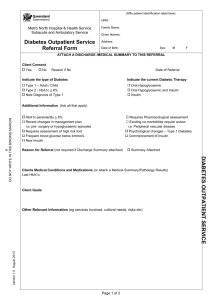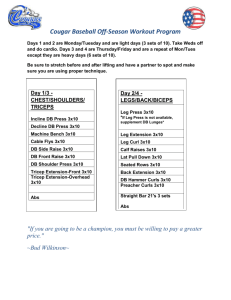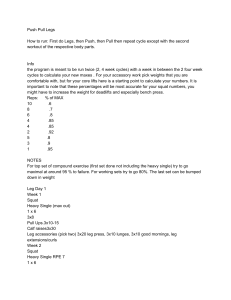High Intensity Resistance Training Improves Glycemic Control in
advertisement
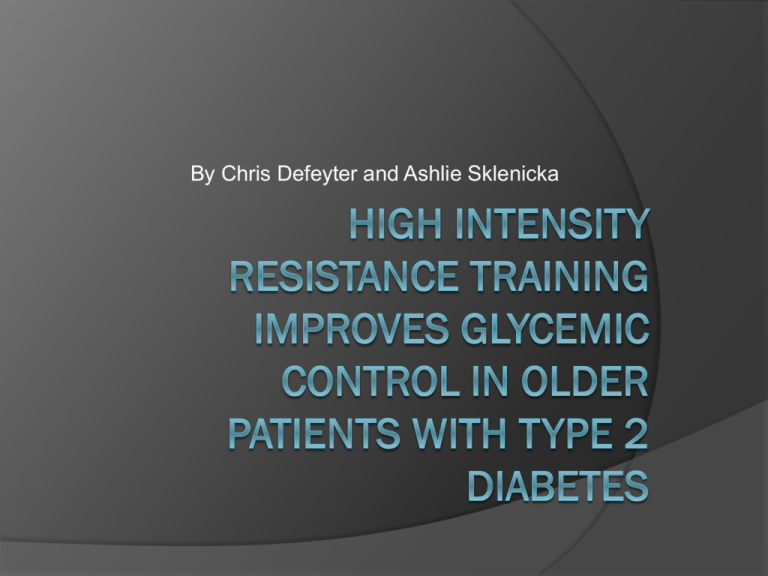
By Chris Defeyter and Ashlie Sklenicka Type 2 Diabetes Type 2 diabetes is when your body doesn’t use insulin properly. At first your pancreas makes extra insulin to make up for it and over time it isn’t able to keep up and can’t make enough to keep your blood glucose levels normal. Why we chose this topic? Little is known about the impact of resistance training and diabetes The regimen for improving the metabolic profile with resistance training of older patients with type two diabetes seemed interesting. Diabetes is a growing problem in the US in all ages. Characteristics of Population Men and women ages 60-80 with type 2 diabetes Subjects were overweight, sedentary, were not taking insulin, and nonsmokers. 110potential volunteers were invited to attend a 6 month clinical trial Out of the 110 volunteers 47 were taken, 36 agreed to do the tests. After exclusions 29 were allowed to do the testings with an ending drop out rate of 19% Exclusions History or physical findings of ischemic heart disease Systemic diseases Uncontrolled hypertension Advanced diabetic neuropathy or retinopathy. Subjects with severe orthopedic, cardiovascular or respiratory conditions 6 people dropped out of the study after 8 weeks Hypothesis The aim of this randomized controlled trial was to examine the effects of a 6 month high- intensity progressive resistance training program, combined with a healthy eating designed to elicit moderate weight loss, on HbA1c and body composition in older adults with type 2 diabetes. Testing of Hypothesis 6-month randomized controlled clinical trail with repeated measurements performed at 3 month intervals. Subjects were randomly assigned to either a high- intensity progressive resistance training plus moderate weight loss group. There was a resistance training and weight loss group and a control group that was just on a weight loss group. Used specific machines that tested HbA1c levels in the patients. Sessions 3 times per week on nonconsecutive days 5 min warm up and cool down of low intensity stationary cycling and a 45 minute of high-intensity resistance training Goal: to achieve between 75 and 85% of the current 1-RM. Sessions Progressive resistance training program used free weights and a multiple-station weight machine. Used 3 sets of 8-10 reps Training increased regularly as tolerated for each muscle group and 1RM was reestablished every 12 weeks. Used 9 different exercises Bench press Leg extensions Upright row Lateral pull downs Standing leg curl Dumbbell seated shoulder press Dumbbell seated bicep curls Dumbbell triceps kickbacks Abdominal curls Results HbA1c: in the RT and WL programa significant reduction in HbA1c at 3 and 6 months There was no change for the WL group In body composition and changes in Anthropometic there was a significant reduction for both RT and WL and just the WL groups Expected muscle strength increased in RT and WL but no in the WL group Conclusion The reduction in the HbA1c after resistance training is likely to offered a prognostic advantage in older patients with type 2 diabetes. Patients with type 2 diabetes have reported improved insulin sensitivity. FITT recommendations Frequency: 3-7days/ week Intensity: 40%-60% of VO2R Time: 150 min/ week Type: Emphasize activities that use large muscle groups in a rhythmic and continuous fashion. Special considerations Hypoglycemia is the most serious problem for individuals with DM who exercise Blood glucose monitoring before and for several hours following exercise The timing of exercise: using insulin, changing insulin timing, reducing insulin dose. Physical activity combined with oral hypoglycemic agents haven’t been studied and little is known about potential interactions. Exercise Prescription All are 65% of 1RM and will increase every 12 weeks 5 minute warm up Bench Press 3x10 Shoulder Press 3x10 DB Flies 3x10 Biceps 2x10 Triceps 2x10 Core 3-5 min 5 minute cool down Monday Tuesday Cycling Elliptical 20 min 20 min At a moderate intensity of 50% All are 65% of 1RM and will increase every 12 weeks 5 minute warm up Leg press 3x10 Leg extension 3x10 DB Lunges 2x10 Lat pull down 3x10 DB bent row 3x10 Core 3-5 min 5 minute cool down Wednesday Cycling Elliptical 20 min 20 min At a moderate intensity of 50% Thursday All are 65% of 1RM and will increase every 12 weeks 5 minute warm up Bench press 3x10 Shoulder Press 3x10 Leg Press 3x10 Lat pull downs 3x10 Triceps 2x10 Biceps 2x10 Core 3-5 min 5 minute cool down Friday
